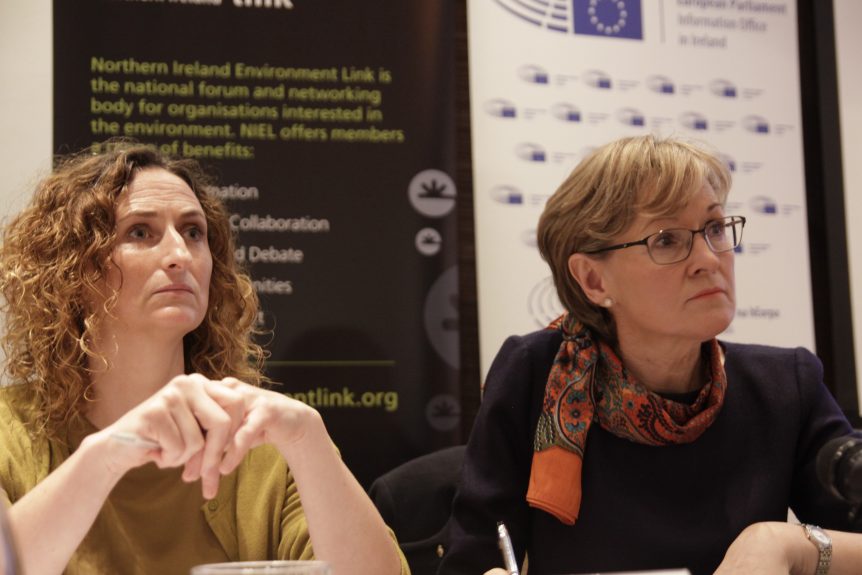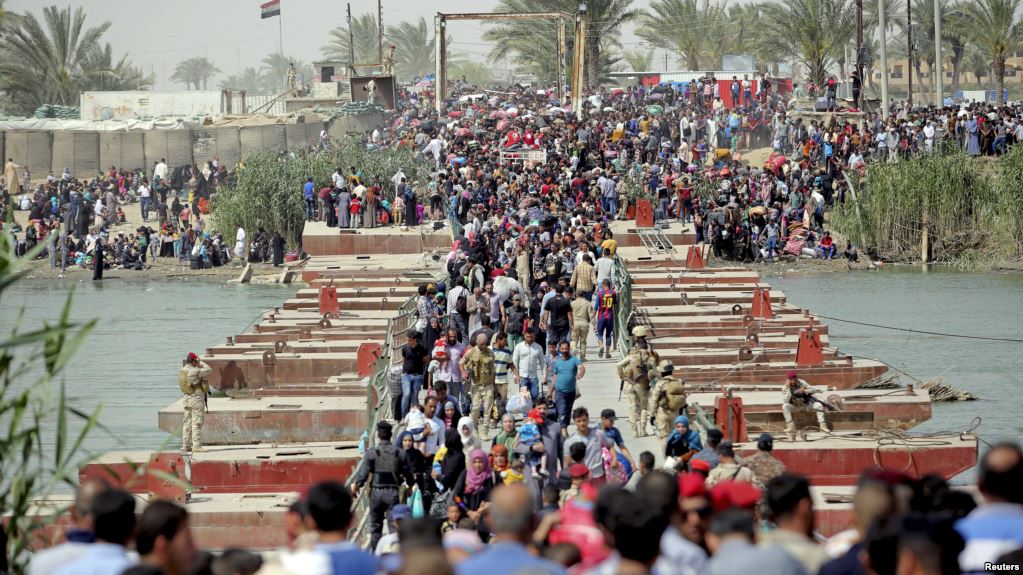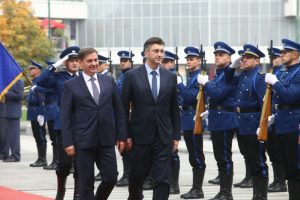The National, 06 September 2017
Campaigning for an independence referendum officially got underway in Iraq’s Kurdistan Region on Tuesday despite international calls to delay the vote.
Iraq’s central government, along with Ankara, Tehran and Washington all oppose the September 25 poll. Baghdad says the referendum is unconstitutional while the US Turkey and Iran say it will distract from the fight against ISIL.
The Kurdish Regional Government has ignored the pleas and pressed ahead with the vote plans. The Kurdistan region's electoral commission said on Tuesday the campaign would last for 18 days with the Iraqi Kurdish diaspora able to vote on September 23, two days ahead of the main poll.
Voting will take place both in the semi-autonomous Kurdistan region and in areas that are still disputed such as Kirkuk, which is claimed by both Baghdad and the KRG in Erbil.
Kurds in Erbil took to the streets on Tuesday in celebration by waving the Kurdistan flag and chanting various slogans in support for independence for the Kurdistan Region.
“For many Kurds across the region, I feel a sense of kinship with my people, it’s been our ultimate dream to have an independent state,” Shermin Hamidi, a Kurdish Iraqi primary school teacher in Erbil, said.
“The referendum is a momentum of excitement for the Kurdish people, whether or not it will make a difference, the fact that it is being held on September 25 gives hope that our dream is actually going to become a reality,” Ms Hamidi said.
Iraq’s main international partners fear the referendum will lead to further complications between Baghdad and Erbil.
Turkish and Iranian concerns are underpinned by fears the poll could encourage secession in their own Kurdish-majority regions.
Kurdish officials in Iraq have insisted that the international community has offered no guarantees for the rights of the Kurdistan region should they delay the event.
The referendum reignites the issue of disputed territories with further implications for the fragile relationship between Erbil and Baghdad.
Kirkuk, which is home to Arabs, Turkmens, Christians and Kurds is a focal point of the dispute.
Last week, Kirkuk's provincial council voted to hold the referendum in the province, which lies outside the official KRG border but has been secured since 2014 by Kurdish peshmerga, who swept in as ISIL approached the city.
Only 24 of the 41 council members attended the vote, with 23 voting in favour of participating in the referendum and one abstaining. The remaining council members — all Arabs and Turkmen — boycotted the vote. Instead, they issued statements denouncing the vote as unconstitutional.
Iraqi prime minister Haider Al Abadi rejected the decision for Kirkuk to take part on the referendum. His spokesman, Saad Al Hadithi, called the decision "illegal and unconstitutional". The decision is expected to have dangerous implications not only for the future of Kirkuk but also for Iraq as a whole.
However, Masoud Barzani, president of the Kurdistan Region insisted that “there is no turning back” on the vote.
The Change Movement, also known as Gorran, and the Kurdistan Islamic Group both want the vote to be postponed. Gorran, the main opposition group, believes the current arrangement for holding the referendum is “illegal and insists parliament is the right institution to call for the vote when the time is right”.
However, the vote was called by Mr Barzani’s Kurdistan Democratic Party and was backed by the Patriotic Union of Kurdistan, the third largest party in Kurdistan, led by Jalal Talabani.
Meanwhile, on Monday, deputy prime minister Qubad Talabani urged for “unanimity” in Kurdistan’s politics and society ahead of the referendum.
Mr Talabani’s statement came during a state visit by British minister of state and foreign office Alistair Burt to Erbil.
Mr Burt assured Kurdish authorities that Britain can still foster continued dialogue between the regional and central governments.
More than 5 million people are eligible to vote according to the commission.
"The United Kingdom is very keen to help and assist in this process of continuing dialogue between Erbil and Baghdad and we believe that this dialogue is continuing even up until the 25th of September."
A delegation from the Iraqi Shia National Alliance is set to visit the Kurdish region this week for talks on the independence referendum. The delegation is expected to urge Kurdish officials to postpone the vote.
No comments yet.
-
 MEPS HEAR NGOS ON BREXIT RIGHTS
Europe - EU
06.09.2017
MEPS HEAR NGOS ON BREXIT RIGHTS
Europe - EU
06.09.2017
- BREXIT EU IMMIGRATION PLAN REVEALED IN LEAKED DOCUMENT Europe - EU 06.09.2017
- DACIC "HOPES SERBIA WILL JOIN EU BEFORE EU FALLS APART" The Balkans 06.09.2017
-
 DISPLACED SUNNI IRAQIS CLAIM SHIA MILITIA BLOCKING THEIR RETURN
Iraq
06.09.2017
DISPLACED SUNNI IRAQIS CLAIM SHIA MILITIA BLOCKING THEIR RETURN
Iraq
06.09.2017
-
 CROATIAN PM PLENKOVIC IN AN OFFICIAL VISIT TO BiH AS OF TODAY
The Balkans
06.09.2017
CROATIAN PM PLENKOVIC IN AN OFFICIAL VISIT TO BiH AS OF TODAY
The Balkans
06.09.2017
-
25.01.2016
THE ARMENIAN QUESTION - BASIC KNOWLEDGE AND DOCUMENTATION -
12.06.2024
THE TRUTH WILL OUT -
27.03.2023
RADİKAL ERMENİ UNSURLARCA GERÇEKLEŞTİRİLEN MEZALİMLER VE VANDALİZM -
17.03.2023
PATRIOTISM PERVERTED -
23.02.2023
MEN ARE LIKE THAT -
03.02.2023
BAKÜ-TİFLİS-CEYHAN BORU HATTININ YAŞANAN TARİHİ -
16.12.2022
INTERNATIONAL SCHOLARS ON THE EVENTS OF 1915 -
07.12.2022
FAKE PHOTOS AND THE ARMENIAN PROPAGANDA -
07.12.2022
ERMENİ PROPAGANDASI VE SAHTE RESİMLER -
01.01.2022
A Letter From Japan - Strategically Mum: The Silence of the Armenians -
01.01.2022
Japonya'dan Bir Mektup - Stratejik Suskunluk: Ermenilerin Sessizliği -
03.06.2020
Anastas Mikoyan: Confessions of an Armenian Bolshevik -
08.04.2020
Sovyet Sonrası Ukrayna’da Devlet, Toplum ve Siyaset - Değişen Dinamikler, Dönüşen Kimlikler -
12.06.2018
Ermeni Sorunuyla İlgili İngiliz Belgeleri (1912-1923) - British Documents on Armenian Question (1912-1923) -
02.12.2016
Turkish-Russian Academics: A Historical Study on the Caucasus -
01.07.2016
Gürcistan'daki Müslüman Topluluklar: Azınlık Hakları, Kimlik, Siyaset -
10.03.2016
Armenian Diaspora: Diaspora, State and the Imagination of the Republic of Armenia -
24.01.2016
ERMENİ SORUNU - TEMEL BİLGİ VE BELGELER (2. BASKI)
-
AVİM Conference Hall 24.01.2023
CONFERENCE TITLED “HUNGARY’S PERSPECTIVES ON THE TURKIC WORLD"









